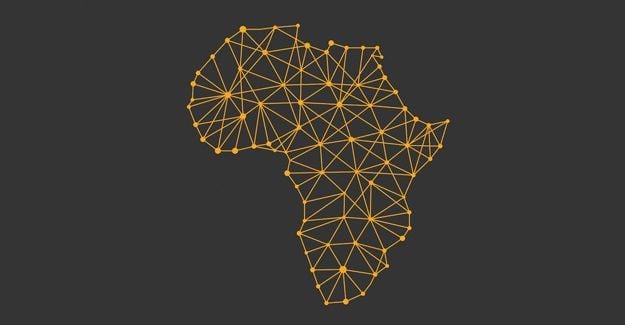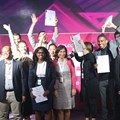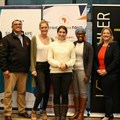#AfricaMonth: Pitching for Africa

Christophe Viarnaud, founder of AfricArena, introduced the inaugural AfricArena world tour at the end of April. The itinerary includes stops at a handful of the ‘fastest growing African tech cities’. It started in Mauritius and Reunion Island last week, moving on to Nairobi on 13 June, Casablanca on 4 July, Lagos on 18 July, and Dakar on 19 September.

Each stop will include fast-paced startup pitch battles – both in corporate challenge format and investor format, with the three overall winners appearing at the AfricArena 2018 conference, set for 15 and 16 November in Cape Town.
Fittingly, that’s right in the middle of global Entrepreneurship Week.
Time for African tech to shine
Taking that reach beyond the borders of the continent, four of the startup winners of AfricArena 2017 will also be taken on an investor road show to New York and Paris, pitching Africa as an investment destination, as well as to VivaTech in Paris, with the latter featuring a dedicated ‘Afric@Tech’ section for the first time from 24 to 26 May.
AfricArena itself is designed to create traction for African startups as the stars of the show. If you missed it last year, Viarnaud says the arena is like sitting in a movie, putting the startups at the centre of the media, investors’ and corporates’ attention, so they’re pitching for two days over a number of challenges in investor format, to make them shine and sign the corporates and investors.
There will again be a battle pitch session on the main arena stage, designed to hold the best pitching startup sessions on the continent assisting them to showcase their product/service in front of the investors.
To get there, they first need to excel at the open innovation challenge pitches, organised for the corporates and sponsors to select a startup to partner with in creating a solution to an identified problem. Three of these startups from across Africa will then pitch at AfricArena, with the winner rewarded with a POC and/or incubation programme with the corporate.
The specific tour challenges are as follows:
- In the RCS Bank challenge, RCS is looking for a product/technology to secure and store customer ID and authentication credentials, in order to ease customer on-boarding and transaction approval.
- In the Vinci Energies Challenge, Vinci Energies is looking for a product/technology to make energy more accessible in Africa thanks to energy efficiency solutions, energy flows optimisation blockchain or AI.
- In the ‘best of ecosystem’ challenge, by French Tech Ile Maurice and La Reunion French Tech, the disruptive startups of each AfricArena tour city are invited to pitch for us. Startups that already have market or customer validation looking for international exposure are welcome to apply.
There are also investor pitches, offering the best startups on the continent the opportunity to pitch in front of the investors present on-site as well as online as the event is streamed globally.
That’s how AfricArena showcases and promotes the African ecosystem components to the rest of the world, from skills development to incubators and community-based groups like Silicon Cape, from all corners of Africa.
Viarnaud said investors will be shown how to work effectively with African startups, too. So there’s a marketing element, but it’s also about the relationships built with the startups to deliver a durable, pan-African impact.
That way, there’ll be more money, year-after-year, coming in to fund startups.
The African startup ecosystem
Explaining the ecosystem, Partech Ventures’ latest annual funding report shows that venture capital funding in 2017 reached $560m, recording 53% year-on-year growth. South Africa, Kenya and Nigeria dominate with 76% of the total funding. Francophone Africa is accelerating with 14% of deal transactions. Interestingly, financial inclusion in the form of off-grid tech, fintech and insuretech represent 45% of those deals.
Rudi Visser, head of innovation acceleration for RCS; and Xabiso Lombo, winner of last year’s startup challenge and founder of Guardian Gabriel; explained the benefit of their involvement in AfricArena from a corporate and entrepreneurial perspective respectively, as well as how to make the most of the AfricArena pitch process this year…
The corporate benefit on the startup pitches
Visser explained that innovation happens everywhere in the business, so his role as head of innovation acceleration is to accelerate the processes that help them work with startups, particularly in the fintech space, while also easing the process of access to market and access to the customer.
First, Visser shared that RCS is interested in finding the interesting in unconventional spaces. The brand’s evolution has seen a shift from product innovation to business model innovation and now going into customer experience innovation, part of which is an amalgamation of all those elements.
How do we change the way the customers engage with brands and products and services?Visser says that’s what RCS is looking for – at the heart of what they do is a focus on how do they better serve their customer and remove friction.
That extends to their retail partners and their own staff, for example using loyalty programmes for employee value proposition building.
Within a corporate environment, Visser says there are a number of spaces where you can find solutions and plugin. That’s what they love about the AfricArena approach – there’s a specific challenge put forward, which is relevant to the current space they’re in. It’s not a hypothetical, but a real-world problem that needs a solution from the continent.
Beware the business echo chamber!
Visser added that corporates, in particular, need stronger links to entrepreneurs. They’re supporting the challenge for the second year as a sponsor, fitting as the RCS itself was born as a startup within the Foschini Group and they focus on driving innovation.
Visser says there are two important reasons for corporates to get involved in these events. First: what you don’t know will always hurt you. Second: None of us is as smart as all of us. Putting these into practice, they avoid the echo-chamber approach when looking at ways to future-proof their business and continue to service their customers.
Simply doing your own research and looking at your own internal structures is not going to help you create the future.
The future doesn’t happen within your business, the future happens out in the market.Visser ended with a reminder of the saying that systems and structures override good intentions any day. To avoid that, the systems and structures they put in place involve working with the ecosystem as part of the corporate learning journey.
Ready for the rise of student entrepreneurs?
Xabiso Lombo won the early-stage pitching startup challenge in the securitech space at AfricArena last year when still a student, with her pitch for the Guardian Gabriel wearable panic button. It requires no connectivity, as your cell phone is often the first thing perpetrators steal.
Lombo knew nothing about business when she started out and shares that breaking into the network is very hard, especially with the rise of student entrepreneurs. When she needed help executing the idea, she researched incubators in South Africa.
The @AirFranceKLM delegation visited the @FSAT_Labs yesterday, expressing once again their support to the local tech ecosystem and #AfricArena2018. Our incubated startups had the occasion to demonstrate their pitching skills before this friendly, yet challenging audience ! pic.twitter.com/VNl75v8bsM
— FSAT Labs (@FSAT_Labs) April 5, 2018
Lombo said student entrepreneurs definitely want more of these challenges but they’re hard to find, so she suggests marketing startup pitching events at universities.
Pitching advice for startup entrepreneurs
Lombo then shared her advice to others looking to pitch at this year’s incubators and startup challenges.
There is a rise of student tech entrepreneurs & students find it difficult to tap into the support ecosystems available #AfricArena #XolisaLombol, founder of Gardian Gabriel, #AfricArena 2017 winners #CapeConfidence #siliconcape pic.twitter.com/6H1akRgs5V
— Wesgro (@Wesgro) April 24, 2018
Always be ready to pitch to anyone.
“Always be ready to pitch to anyone & understand what your product is. There are many opportunities that aren’t necessarily related to funding so remember you’re pitching to everyone in the room” advise from Xabiso Lombol from Guardian Gabriel, 2017 #AfricArena winners pic.twitter.com/rHmkXUygF2
— Wesgro (@Wesgro) April 24, 2018
- Learn as much as you can from the experience;
- Learn from how others’ pitches;
- Do your best; and
- Always have fun
Wesgro CEO Tim Harris called this “brilliant advice for anyone to follow.”
Lombo was also asked by the audience how pitching had changed her thought process, as well as how to deal with investors as a student looking to grow the business idea. It’s a bold enough move to enter the incubator space but the next step of actually taking on investment changes your whole world again.
Before attending AfricArena, Lombo’s idea of pitching was: “this is the problem, make them believe that it needs to be solved”. Instead, she learned that only a few minutes are spent in describing the problem to get to the money and investment.
Through pitching, she learned how to speak the business language and see where she wants to see herself and her startup, years from now.
So pitching is a great way to see how viable your business idea is, and how you can get to the next phase of your business. Lombo says the challenge lies in realising that investors’ main priority is to make money, so you have to find a way to still play out the values of your business while making it profitable. As such, Guardian Gabriel hasn’t yet launched or generated revenue but is currently looking to attract investors.
Follow AfricArena on Twitter @AfricArena2018 and the #AfricArena hashtag for the latest updates!









































